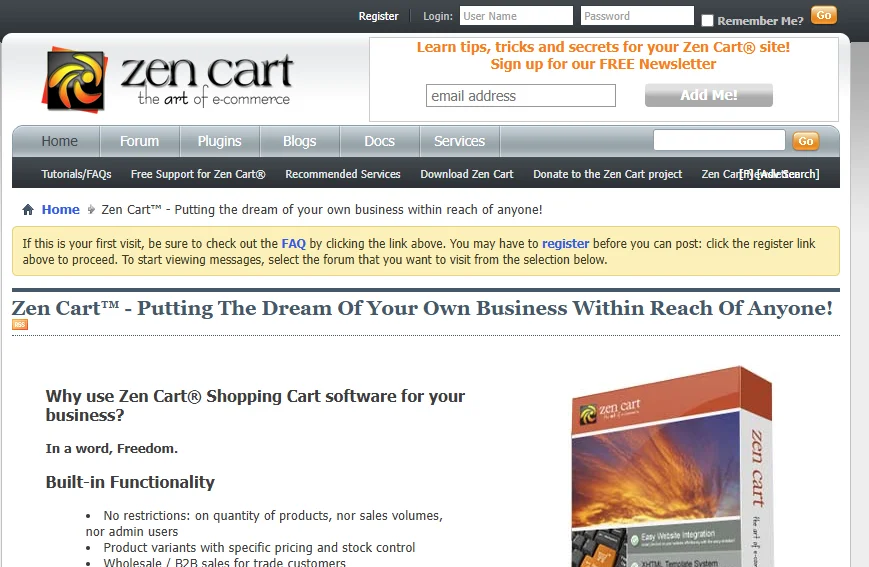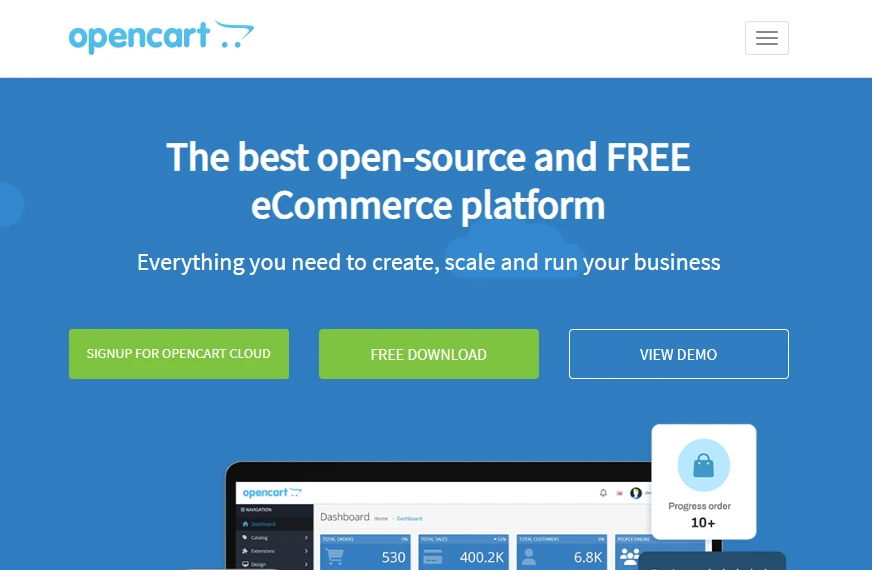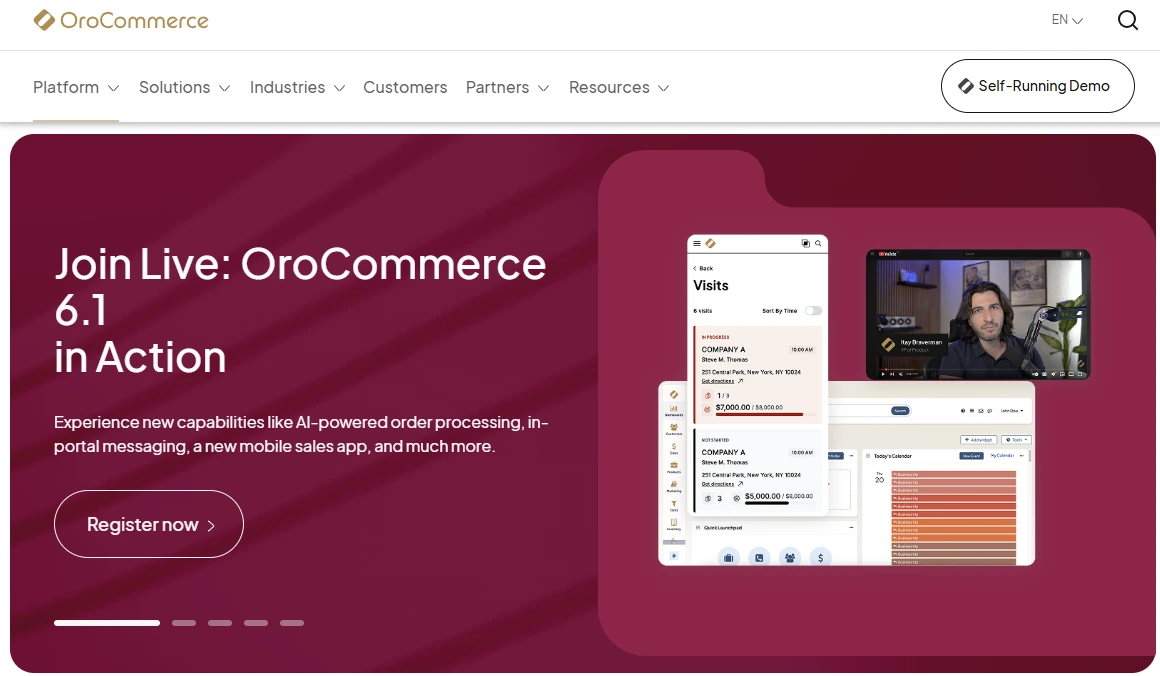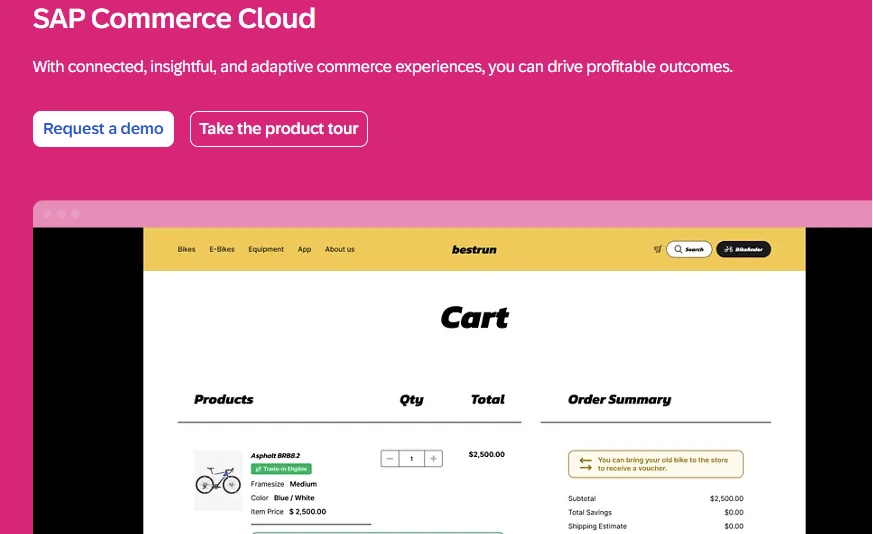Hyvä Theme is Now Open Source: What This Means for Magento Community - Mageplaza
Hyvä is now Open Source and free. Discover what changed, what remains commercial, how it impacts the Magento ecosystem, and how to maximize its full potential.

As you’re starting out in the e-commerce industry, it can be challenging to select a B2C or a B2B e-commerce platform that offers you the necessary infrastructure and facilities at an affordable price. It’s essential to discover your options beyond the more obvious, so you can provide the right service for your business and your budget.
As one of the most renowned service providers, Magento is a dominant option among most e-commerce businesses. Thanks to its customizable nature, hassle-free scalability, and code-level access, it is the favorite option for most medium-to-large-sized enterprises.
However, it is not always the ideal choice for every business. The following article will demonstrate this year’s top 8 viable Magento alternatives/ competitors.
Are you ready? Let’s dive right in.

Whether you have already used Magento and feel like there might be a better choice out there, or if you still just regard Magento as part of your research, there are some reasons you might want to keep your choices open.
Compared to other alternatives, Magento often goes with big budgets. Obviously, the product you select will decide how much your Magento license will cost you. Magento Open Source is technically free to install from the Magento website, but that won’t include your total cost of ownership. You will need to pay for all the design and improvement fees to run your site, along with constant costs for all hosting, enhancements, e-commerce security, and design fees.
Magento Commerce costs vary from $23,000 to $125,000 per year, based on the size and complexity of your online store. Magento Commerce Cloud is way more costly, with sources indicating it can vary from $40,000 to $190,000.
A lot of businesses do not have enough budget to spend each year on Magento and instead need to use resources on other integral areas of their operations. As a result, they consider finding a Magento 2 alternative as an ideal solution to solve their monetary problem.
One of Magento’s major selling points is its openness to extensive customization. However, to make complicated changes while maintaining your integrations working well and data flowing seamlessly - you may need a team of Magento developers at work who truly apprehends the sophisticated infrastructure.
This isn’t just important when you’re getting your website up and running (which could require anywhere from six weeks for a basic site to as much as one year for a more complex build), but also as you keep tracking and upgrading your store. You’ll need experienced developers to upgrade, patch, and seek plugins for your website. Their time means your money and that makes many store owners try to find out a Magento 2 alternative.
Magento’s biggest asset - the chance to generate whatever you want for your store - also results in one of its biggest weaknesses. The tremendous range of extensions and plugins that you can use with the Magento system can also make your system fall behind other solutions in terms to speed. Moreover, due to the system’s complexity, if you do not want to migrate to another Magento 2 alternative, it can be a time-wasting task for developers to improve the site for speed.
Say Goodbye to Slow Page Loading
Get Website Performance Audit. Speed it up - earn more sales & customer satisfaction.

Magento has tons of factors you need to stay on top of; if you don’t, your website can crash, slow down, or not work as expected. Consequently, you might likely face a number of bugs and glitches with the software.
Magento and its community are great at generating patches to address these problems; however, it will take your developers time to start instituting all of these patches. And apparently, you can’t forget about security patches; ignoring them could lead your site to unnecessary risks. That’s time they’re using on more value-adding, creative projects.
The first idea to leave your existing Magento platform isn’t your own. For instance, Magento ceased supporting its Magento 1 product in June 2020. By no longer offering critical patches and updates, Magento has made Magento 1 stores risk falling out of PCI compliance, losing their payment processors, and not getting the modules or developer resources they need to run a functioning site.
Magento is stimulating store owners to migrate from the now unsupported and insecure Magento 1 to Magento 2. Nevertheless, due to the discrepancies between the two platforms, it will require heavy work to migrate. If you’re thinking you will be doing most of the same work of re-platforming anyway, this could be your chance to look for another Magento 2 alternative.
Magento 2 Migration Service
Let’s unlock the latest features and functionalities, while protecting your store from security breaches!
Get free consultationMagento 2 alternatives have two types, including website builders and other open-source platforms.
Website builders, also called Software as a Service (SaaS), offer an incredible solution, letting anyone construct a site quickly and easily with a flat-fee subscription.
Open-source platforms like Magento provide unlimited customization, as long as you know how to code. They charge no fee to install, and you can build any type of e-commerce store you want, either by customizing a template or forming a whole new site from scratch. The software itself is free, but you need to pay for strong security function, hosting, maintenance fees.

Known as an e-commerce heavyweight, BigCommerce is suitable for ambitious businesses looking to conquer new heights. This Magento 2 alternative boasts its wealth of built-in features and data reporting tools, bringing an average annual development rate of 28% for its users every year.
Here are some amazing built-in features of BigCommerce:
Advantages
Disadvantages
Read more: Magento 2 vs BigCommerce: Which one is better?
Pricing
You can try 15 days for free and then pick a plan as follows:

Beside BigCommerce, Shopify is considered a noticeable Magento 2 alternative which serves more than 600,000 merchants all over the world. It comes with intuitive design tools, excellent sales features, beautiful templates, and dedicated customer support, all in one place.
With more than 1,200 apps to add additional functionality, Shopify is filled with brilliant built-in tools to help your business sell and thrive. These tools include:
Advantages
Disadvantages
Pricing
Shopify currently has a 3-day free trial and a $1/month discount for the first month. If you love using Shopify, you’ll need to move to one of its premium plans when the trial is over.

Instead of a dedicated e-commerce platform like BigCommerce or Shopify, Wix is a website builder which enables you to bring e-commerce functionalities to your site via its Wix Stores feature.
That’s the reason why Wix is the ideal option for small online store owners - Wix requires nearly zero tech experience, and you can create stunning storefronts that function seamlessly.
This Magento 2 alternative provides more than 250 apps within its app market, which you can add with one click.
Advantages
Disadvantages
Pricing
Wix doesn’t offer any free trial period, but you can create your online storefront without any costs. Nevertheless, to take payments and begin making money, you’ll need to upgrade one of the premium pricing options:
Read more: Magento 2 vs Wix: Which Ecommerce platform to use for online store?

The final Magento 2 alternative we would like to mention is Squarespace. It constitutes the most popular website builder for forming remarkable storefronts. Its e-commerce tools are also not too shabby. The platform is perfect for appealing magazine subscription websites and restaurant booking systems.
Advantages
Disadvantages
Pricing
The platform does include a 14-day free trial and four pricing plans - two of which allow you to sell online.
Basic Commerce is appropriate for smaller businesses, while the other one uncovers more advanced tools like abandoned cart recovery, gift vouchers, and the capability to sell subscription products.
Read more: Shopify vs Squarespace: Which Platform Should You Choose?

WooCommerce is an outstanding e-commerce plugin for WordPress. It is one of the most dominant e-commerce solutions on the market, letting you convert your WordPress website into a functioning online store.
If you know a thing about code, then you get free reign in terms of customization. Besides, you can select from tons of extensions from the WooCommerce extension store to provide your website with impressive functionality in every area of e-commerce.
WooCommerce comes with the following built-in tools:
Advantages
Disadvantages
Pricing
It charges no fee to install WooCommerce, but you might need to invest in extra features like hosting (approximately $35-$50 annually), a theme design ($39+), security, and website maintenance.
Read more: Magento vs WooCommerce comparison: Which One is Better?

Zen Cart is an open-source platform in need of some improvements. The dashboard is old-fashioned and difficult to navigate, while the choice of templates is limited. Nevertheless, Zen Cart is greatly customizable if you know how to code, bringing you more creative freedom, and you can go to a huge community of web developers if you need support.
Some notable built-in features of Zen Cart include:
Advantages
Disadvantages
Pricing
The costs of using an open-source platform range depending on each merchant. With Zen Cart, you will have to get a domain name, a hosting provider, and a security certificate.

If you are getting used to Magento, you might feel comfortable moving to OpenCart. They are both created with the same code, and have numerous plugins to personalize your online store.
You’ll have a chance to access more than 13,000 apps to add more features to your store, and you can modify the code as you want.
Advantages
Disadvantages
Pricing
Suppose you have the demand to receive dedicated customer support. In that case, you’ll pay a monthly fee of $99, or $99 for one-time support whenever you have a problem, in addition to your monthly domain, hosting, and security fees.
Read more: Magento vs. Opencart: A Detailed Comparison

Having been used by more than 300,000 merchants, Prestashop appears as a proper option for every type of online store. It brings in total creative freedom - if you have knowledge of HTML, CSS, and JavaScript files - and access to over 1,500 extensions.
PrestaShop does come with an impressive number of built-in tools, including:
Advantages
Disadvantages
Pricing
Similar to WooCommerce, Prestashop is free to install, but comes with extra costs. You’ll need to pay money for hosting, security, and dedicated customer support plans.
PrestaShop’s themes cost at $65 each, and the modules can cost from $30 to $500 each.
Besides noticeable Magento 2 alternatives, there are some famous competitors for you to consider.

Shopify Plus is a premium, cloud-based eCommerce solution designed for fast-scaling businesses. It offers a turnkey SaaS environment, allowing merchants to launch and manage stores without extensive backend development.
Key features:
Advantages:
Disadvantages:
Pricing:

Salesforce Commerce Cloud is a robust, cloud-native eCommerce solution designed for enterprise-scale businesses. It integrates deeply with Salesforce’s CRM, Marketing Cloud, and Service Cloud, offering a full suite for unified commerce.
Key features:
Advantages:
Disadvantages:
Pricing:

OroCommerce is an open-source B2B eCommerce platform created by the co-founder of Magento. It caters specifically to complex B2B workflows and long sales cycles.
Key features:
Advantages:
Disadvantages:
Pricing:

CommerceTools is a headless, API-first commerce platform designed for developers and enterprises that want full control over their eCommerce experience. It follows the MACH principles (Microservices, API-first, Cloud-native, Headless).
Key features:
Advantages:
Disadvantages:
Pricing:
Custom pricing based on GMV, API usage, and services Typically starts from $5,000/month or more

BigCommerce Enterprise is a scalable SaaS platform that provides enterprise-grade features with a user-friendly interface. It supports both B2B and B2C use cases and is known for its flexibility and speed to market.
Key features:
Advantages:
Disadvantages:
Pricing:

SAP Commerce Cloud (formerly Hybris) is an enterprise eCommerce solution that integrates deeply with the SAP ecosystem. It is designed to support highly customized, multi-national B2B and B2C businesses.
Key features:
Advantages:
Disadvantages:
Pricing:

Scalability is a critical factor when evaluating e-commerce platforms as alternatives to Magento.
Your chosen platform should seamlessly accommodate growth in products, traffic, and transactions without encountering significant performance issues. It’s essential to look for solutions that offer straightforward scaling options, whether through higher-tier plans, cloud services, or efficient resource management.
Ensuring that your online store remains fast and responsive as it expands is crucial for sustained success.
Plugin and integration systems play an important role in improving the functionality of your e-commerce platform. A diverse selection of integrations and plugins extends the platform’s capabilities, allowing you to incorporate features such as social media selling, advanced analytics, or customer loyalty programs.
When evaluating alternatives to Magento, it’s essential to assess the ecosystem for compatibility with your essential business tools and the quality of available plugins. This ensures that your chosen platform seamlessly integrates with the tools you rely on and provides the necessary flexibility to enhance your online store’s performance.

When you develop an eCommerce website, you need to attract and retain customers. Thus, your chosen platform should incorporate SEO features to optimize product pages, meta tags, and URLs.
Additionally, having marketing tools for email campaigns, discounts, and seamless social media integrations is essential for driving traffic and boosting sales.
An intuitive and pleasant shopping experience directly influences conversion rates and boosts customer loyalty.
When considering alternatives to Magento, consider platforms with strong UX design capabilities. These platforms should offer mobile responsiveness, customizable themes, and user-friendly checkout processes. Design flexibility is also crucial because it allows you to create a unique brand presence online.

Due to the high risk of e-commerce transactions, you should choose platforms that offer strong security solutions.
Here are the essential features related to security and compliance that you should prioritize:
SSL certificates: Look for platforms that provide secure communication between your website and users by implementing SSL certificates.
Secure Payment Processing: Ensure the platform supports secure payment gateways to protect sensitive financial data during transactions.
PCI DSS Compliance: Compliance with the Payment Card Industry Data Security Standard (PCI DSS) is crucial for protecting customer payment information.
Remember, customer trust is paramount in e-commerce, and robust security measures are essential to maintain that trust. Prioritize platforms that offer these features to protect both your business and your customers’ data.
When considering Magento alternatives, it’s essential to take into account the support and the community associated with each platform. Here’s why these factors matter:
Look for platforms that offer professional support. Having access to expert assistance is really vital when you encounter technical issues or need guidance.
Consider whether the platform provides 24/7 support or has a responsive customer service team.
A vibrant user community can enhance your experience. It allows you to connect with other users, share insights, and learn from their experiences.
Platforms with active forums, discussion boards, and user-contributed resources can provide valuable troubleshooting tips and advice.
When choosing an eCommerce platform, it’s essential to evaluate your business size and the type of products you offer.
Different platforms serve different specific needs. Some are ideal for small and medium-sized enterprises (SMEs) or niche markets, while others are designed for scalability and handling complex product catalogs.
In case your business needs to require extensive customization, choosing a platform can support those needs seamlessly. Customization might involve features like custom checkout processes, unique product configurations, or integration with bespoke back-office systems.

You need to consider the overall cost required for a platform. It consists of initial setup fees, monthly or annual charges, transaction costs, and potential expenses for plugins, themes, or custom development. While open-source platforms may initially offer lower upfront costs, they will become expensive when you add more functionalities.
Visualize your business’s future in the coming years. The platform you choose should not only help to meet your current needs but also support potential growth avenues, such as expanding international sales, diversifying product lines, and increasing your customer base.
When evaluating eCommerce platforms, considering your team’s technical capabilities is crucial.
Although these platforms are flexible and powerful, they demand a higher degree of technical knowledge for setup and customization.
If your team has the expertise, open-source solutions can provide extensive customization options.
Hosted platforms offer a more manageable learning curve.
They are suitable for businesses without in-house technical support.
Magento is an eCommerce platform that offers various features for building and managing online stores. Additionally, it supports various payment and shipping methods and is known for its scalability and customizability, allowing businesses to adjust the platform to their specific needs.
There are several reasons why you should consider an alternative to Magento:
Ease of use: Magento can be complex, especially for non-technical users.
Specific requirements: You might need features that Magento doesn’t provide out of the box.
Cost: Magento can be expensive to maintain and customize.
Some Magento 1 and Magento 2 alternatives consist of WooCommerce, OpenCart, BigCommerce, Shopify, SalesForce Commerce Cloud, SAP Commerce Cloud.
Changing from Magento to a different eCommerce platform is a complex process demanding careful planning and implementation. The transition involves migrating data, integrating new software, and ensuring the website remains functional throughout the process.
Moreover, many eCommerce platforms provide comprehensive migration tools and support services to assist businesses in making a smooth transition from Magento to their platform.
Yes, many Magento alternatives provide similar features, such as product management, order processing, and payment gateways. Some popular alternatives include:
WooCommerce: An easy-to-use, customizable platform built on WordPress.
OpenCart: A self-hosted solution with a user-friendly interface.
BigCommerce: A cloud-based platform suitable for businesses of all sizes.
Cost-effectiveness varies depending on your needs. Some alternatives offer more budget-friendly options, while others may have additional costs for specific features or plugins.
Yes! Most alternatives allow customization through themes, plugins, and extensions. However, the level of customization may differ based on the platform.
Yes, many alternatives offer customer support and documentation. The quality of support may depend on the platform in use.
Absolutely! Many Magento alternatives allow integration with other software, such as accounting software, shipping software, and marketing automation tools.
The compatibility of various systems makes these platforms well-suited for implementing e-commerce automation. Thus, it helps to improve efficiency across all aspects of online business operations. However, the level and ease of integration can differ based on the chosen platform.
You should evaluate your business needs and compare them with the features and benefits provided by different platforms. Testing the platform with a free trial or demo can also help you determine if it’s the right fit.
There are numerous options for e-commerce platforms and a lot of factors to consider when choosing the one that works for your business. If you’re currently using Magneto and it does not satisfy your requirements, you should find out what’s out there and how it can support your business more effectively. In case you explore more suitable Magento 2 alternatives, do not hesitate to think about migrating to another e-commerce platform!
This is an important move, so make sure you think carefully before making any decision. Mageplaza hope you can find the best platform to dramatically level up your business.
Related posts: